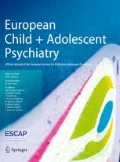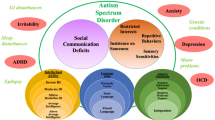Abstract
The majority of studies examining associations between clinical–diagnostic and empirical-quantitative approaches have concentrated only on the target diagnosis without taking into account any possible co-variation of psychopathological traits, which is intrinsic to child psychopathology. The ability of child behaviour checklist (CBCL) DSM-oriented scales (DOSs) to predict target and other DSM diagnoses, taking into consideration the covariation of psychopathological traits, was analysed by logistic regression analysis. Corresponding odds ratio (OR) was used as indicator of the strength of the relationship between the clinical score in DOSs and the presence of DSM-IV diagnoses. Logistic regression allowed us to consider multiple scales simultaneously, thus addressing the problem of co-occurrence of psychopathological traits, and to include gender and age as covariates. The sample consisted of 360 children and adolescents aged 6–16 years, consecutively referred for behavioural and emotional problems. As a whole, the CBCL DOSs seem to be more specific but with a weaker association with DSM-IV diagnoses than syndrome scales, and with some distinctive features: clinical scores in the anxiety DOS suggest a diagnosis of both anxiety and mood disorder; clinical scores in the somatic problems DOS are very strong and specific predictors for diagnosis of separation anxiety disorder; clinical scores in the oppositional defiant problems DOS are not only predictors of the oppositional defiant disorder but are also strong predictors of generalized anxiety disorder; clinical scores in the conduct problems DOS are a specific and strong predictor for oppositional defiant disorder. Results confirm the clinical usefulness of CBCL and suggest using both syndrome and DOS scales for a complete and accurate assessment of children and adolescents.
Similar content being viewed by others
References
Achenbach TM, Edelbrock CS (1983) Manual for the revised child behavior checklist and profile. University Associates in Psychiatry, Burlington
Achenbach TM (1991) Manual for the child behavior checklist/4–18 and 1991 profiles. Department of Psychiatry, University of Vermont, Burlington
Achenbach TM, Rescorla LA (2001) Manual for the ASEBA school-age forms and profiles. Department of Psychiatry, University of Vermont, Burlington
Achenbach TM, Dumenci L, Rescorla LA (2003) DSM-oriented and empirically based approaches to constructing scales from the same item pools. J Clin Child Adolesc Psychol 32(3):328–340
Achenbach TM, Rescorla LA (2007) Multicultural supplement to the manual for the ASEBA school-age forms and profiles. Research Center for Children Youth and Families, University of Vermont, Burlington
Achenbach TM, Becker A, Döpfner M, Heiervang E, Roessner V, Steinhausen HC, Rothenberger A (2008) Multicultural assessment of child and adolescent psychopathology with ASEBA and SDQ instruments: research findings, applications, and future directions. J Child Psychol Psychiatry 49(3):251–275
Aebi M, Winkler Metzke C, Steinhausen HC (2010) Accuracy of the DSM-oriented attention problem scale of the child behavior checklist in diagnosing attention-deficit hyperactivity disorder. Atten Disord 13(5):454–463
American Psychiatric Association (2000) Diagnostic and statistical manual of mental disorders, 4th edn. American Psychiatric Association, Washington (text revision)
Angold A, Erkanli A, Farmer EMZ, Fairbank JA, Burns BJ, Keeler G, Costello EJ (2002) Psychiatric disorder, impairment, an service use in rural African American and white youth. Arch Gen Psychiatry 59:893–901
Biederman J, Faraone SV, Doyle A, Krifcher Lehman B, Kraus I, Perrin J, Tsuang MT (1993) Convergence of the child behavior checklist with structured interview-based psychiatric diagnoses of ADHD with and without comorbidity. J Child Psychol Psychiatry 34:1241–1251
Boylan K, Vaillancourt T, Boyle M, Szatmari P (2007) Comorbidity of internalizing disorders in children with oppositional defiant disorder. Eur Child Adolesc Psychiatry 16(8):484–494
Chen W, Faraone S, Biederman J, Tsuang M (1994) Diagnostic accuracy of the children behavior checklist scales for attention-deficit hyperactivity disorder: a receiver-operating characteristic analysis. J Consult Clin Psychol 62:1017–1025
Chorpita BF, Yim L, Moffitt C, Umemoto LA, Francis SE (2000) Assessment of symptoms of DSM-IV anxiety and depression in children: a revised child anxiety and depression scale. Behav Res Ther 38:835–855
Cohen P, O’Connor P, Lewis S, Velez CN, Malachowski B (1987) Comparison of DISC and K-SADS-P interviews of an epidemiological sample of children. J Am Acad Child Adolesc Psychiatry 26(5):662–667
Connor DF, Edwards G, Fletcher KE, Baird J, Barkley RA, Steingard RJ (2003) Correlates of comorbid psychopathology in children with ADHD. J Am Acad Child Adolesc Psychiatry 42(2):193–200
Costello EJ, Angold A, Burns BJ, Stangl DK, Tweed DL, Erkanli A, Worthman CM (1996) The great smoky mountains study of youth. Goals, design, methods, and the prevalence of DSM-III-R disorders. Arch Gen Psychiatry 53:1129–1136
Costello EJ, Mustillo S, Erkanli A, Keeler G, Angold A (2003) Prevalence and development of psychiatric disorders in childhood and adolescence. Arch Gen Psychiatry 60:837–844
Demyttenaere K, Bruffaerts R, Posada-Villa J, Gasquet I, Kovess V, Lepine JP, Angermeyer MC, Bernert S, de Girolamo G, Morosini P, Polidori G, Kikkawa T, Kawakami N, Ono Y, Takeshima T, Uda H, Karam AN, Mneimneh ZN, Medina-Mora ME, Borges G, Lara C, de Graaf R, Ormel J, Gureje O, Shen Y, Huang Y, Zhang M, Alonso J, Haro JM, Vilagut G, Bromet EJ, Gluzman S, Webb C, Kessler RC, Merikangas KR, Anthony JC, Von Korff MR, Wang PS, Brugha TS, Aguilar-Gaxiola S, Lee S, Heeringa S, Pennell BE, Zaslavsky AM, Ustun TB, Chatterji S, WHO Mental Health Survey Consortium (2004) Prevalence, severity, and unmet need for treatment of mental disorders in the World Health Organization world mental health surveys. JAMA 291:2581–2590
Ebesutani C, Bernstein A, Nakamura BJ, Chorpita BF, Higa-McMillan CK, Weisz JR, The Research Network on Youth Mental Health (2010) Concurrent Validity of the child behavior checklist DSM-oriented scales: correspondence with DSM diagnoses and comparison to syndrome scales. J Psychopathol Behav Assess 32(3):373–384
Edelbrock G, Costello AJ (1988) Convergence between statistically derived behavior problem syndromes and child psychiatric diagnoses. J Abnorm Child Psychol 76:219–231
Egger HL, Costello EJ, Erkanli A, Angold A (1999) Somatic complaints and psychopathology in children and adolescents: stomach aches, musculoskeletal pains, and headaches. J Am Acad Child Adolesc Psychiatry 38(7):852–860
Faraone SV, Biederman J, Jetton JG, Tsuang MT (1997) Attention deficit disorder and conduct disorder: longitudinal evidence for a familial subtype. Psychol Med 27(2):291–300
Ferdinand RF (2007) Predicting anxiety diagnoses with the youth self-report. Depress Anxiety 24:32–40
Ferdinand RF (2008) Validity of the CBCL/YSR DSM-IV scales anxiety problems and affective problems. J Anxiety Disord 22:126–134
Fleitlich-Bilyk B, Goodman R (2004) Prevalence of child and adolescent psychiatric disorders in southeast Brazil. J Am Acad Child Adolesc Psychiatry 43:727–734
Ford T, Goodman R, Meltzer H (2003) The British child and adolescent mental health survey 1999: the prevalence of DSM IV disorders. J Am Acad Child Adolesc Psychiatry 42:1203–1211
Frigerio A, Cattaneo C, Cataldo MG, Schiatti A, Molteni M, Battaglia M (2004) Behavioral and emotional problems among italian children and adolescents aged 4 to 18 years as reported by parents and teachers. Eur J Psychol Assess 20(2):124–133
Frigerio A, Rucci P, Goodman R, Ammaniti M, Carlet O, Cavolina P, De Girolamo G, Lenti C, Lucarelli L, Mani E, Martinuzzi A, Micali N, Milone A, Morosini P, Muratori F, Nardocci F, Pastore V, Polidori G, Tullini A, Vanzin L, Villa L, Walder M, Zuddas A, Molteni M (2009) Prevalence and correlates of mental disorders among adolescents in Italy: the PrISMA study. Eur Child Adolesc Psychiatry 18(4):217–226
Hollingshead AB (1975) Four factor index of social status. Department of Sociology, Yale University, New Haven (Unpublished manuscript)
Ivanova MY, Dobrean A, Dopfner M, Erol N, Fombonne E, Fonseca AC, Frigerio A, Grietens H, Hannesdottir H, Kanbayashi Y, Lambert M, Achenbach TM, Larsson B, Leung P, Liu X, Minaei A, Mulatu MS, Novik TS, Oh KJ, Roussos A, Sawyer M, Simsek Z, Dumenci L, Steinhausen HC, Metzke CW, Wolanczyk T, Yang HJ, Zilber N, Zukauskiene R, Verhulst FC, Rescorla LA, Almqvist F, Weintraub S, Bilenberg N, Bird H, Chen WJ (2007) Testing the 8-syndrome structure of the child behavior checklist in 30 societies. J Clin Child Adolesc Psychol 36(3):405–417
Kasius MC, Ferdinand RF, van den Berg H, Verhulst FC (1997) Associations between different diagnostic approaches for child and adolescent psychopathology. J Child Psychol Psychiatry 38:625–632
Kaufman J, Birmaher B, Brent D, Rao U, Flynn C, Moreci P, Williamson D, Ryan N (1997) Schedule for affective disorders and schizophrenia for school-age children-present and lifetime version (K-SADS-PL): initial reliability and validity data. J Am Acad Child Adolesc Psychiatry 36(7):980–988
Kaufman J, Birmaher B, Brent D, Rao U, Ryan N (2004) K-SADS-PL Intervista diagnostica per la valutazione dei disturbi psicopatologici in bambini e adolescenti. Erickson, Trento (Edizione Italiana a cura di Carla Sogos)
National Institute of Mental Health (1992) Diagnostic interview schedule for children. Division of Child and Adolescent Psychiatry, New York State Psychiatric Institute, New York (version 2.3)
Pliszka SR (2000) Patterns of psychiatric comorbidity with attention-deficit/hyperactivity disorder. Child Adolesc Psychiatr Clin N Am 9(3):525–540
Polier GG, Vloet TD, Herpertz-Dahlmann B, Laurens KR, Hodgins S (2011) Comorbidity of conduct disorder symptoms and internalising problems in children: investigating a community and a clinical sample. Eur Child Adolesc Psychiatry 21(1):31–38
Rettew DC, Lynch AD, Achenbach TM, Dumenci L, Ivanova MY (2009) Meta-analyses of agreement between diagnoses made from clinical evaluations and standardized diagnostic interviews. Int J Methods Psychiatr Res 18(3):169–184
Rosenthal JA (1996) Qualitative descriptors of strength of association and effect size. J Soc Serv Res 21:37–59
Silber TJ, Pao M (2003) Somatization disorders in children and adolescents. Pediatr Rev 24(8):255–264
Silverman WK, Saavedra LM, Pina AA (2001) Test-retest reliability of anxiety symptoms and diagnoses with the anxiety disorders interview schedule for DSM-IV: child and parent versions. J Am Acad Child Adolesc Psychiatry 40(8):937–944
Steinhausen HC (2006) Developmental psychopathology in adolescence: findings from a Swiss study—the NAPE lecture 2005. Acta Psychiatr Scand 113:6–12
Van Lang ND, Ferdinand RF, Oldehinkel AJ, Ormel J, Verhulst FC (2005) Validity of the DSM-IV scales affective problems and anxiety problems of the youth self-report. Behav Res Ther 43:1485–1494
Verhulst FC, van der Ende J, Ferdinand RF, Kasius MC (1997) The prevalence of DSM-III R diagnoses in a national sample of Dutch adolescents. Arch Gen Psychiatry 54:329–336
Verhults FC, Van der Ende J (2008) Using rating scale in a clinical context. In: Rutter M, Bishop D, Pine D, Scott S, Stevenson J, Taylor E, Thapar A (eds) Rutter’s child and adolescent psychiatry. Blackwell, London
Conflict of interest
None.
Author information
Authors and Affiliations
Corresponding author
Rights and permissions
About this article
Cite this article
Bellina, M., Brambilla, P., Garzitto, M. et al. The ability of CBCL DSM-oriented scales to predict DSM-IV diagnoses in a referred sample of children and adolescents. Eur Child Adolesc Psychiatry 22, 235–246 (2013). https://doi.org/10.1007/s00787-012-0343-0
Received:
Accepted:
Published:
Issue Date:
DOI: https://doi.org/10.1007/s00787-012-0343-0




